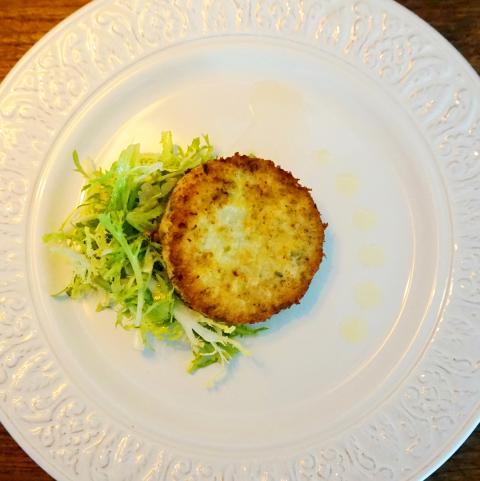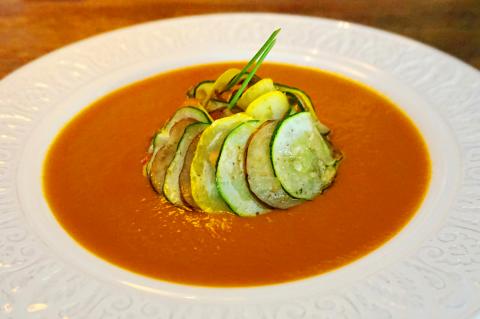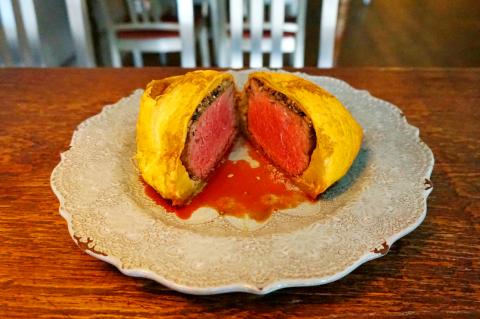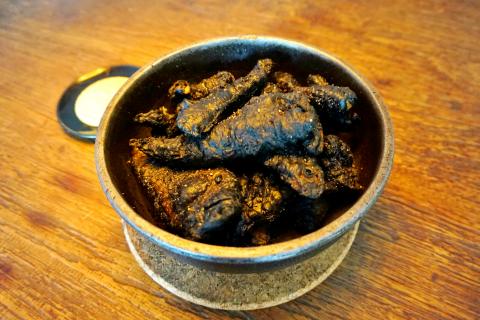Diary was rustic and industrial before it was cool for Taipei restaurants to be rustic and industrial. The compact bistro with antique wooden tables and aluminum chairs on Dongfeng Street (東豐) has been rotating the dishes on their menu — inspired by some European classics such as beef wellington and oxtail ragu — every three or four months since they first opened in 2009.
The bar is the centerpiece of the interior, with herbs and spices in tiny bottles spread across its black marble top. Beyond, the open concept kitchen allows patrons to watch the chefs in action. Culture and design magazines such as Monocle and Wallpaper line the steel bookshelf at the back of the bistro.
The menu is handwritten, like a diary, and drink recipes are scribbled on coasters, an idea that originated from Diary founder, Tyler Wu (伍睿謙).

Photo: Dana Ter, Taipei Times
“It’s like every customer has a piece to add to the story of the restaurant,” Wu tells me when I visit with a friend for an early weekday dinner.
Though simple, the concept makes a lot of sense. It mimics people’s natural instinct to want to record their memories, whether photographing their meals, writing a blog post or verbally relating the dining experience to friends.
Ingredients are imported from all over Europe, while the meat comes from New Zealand and the US. Dairy takes special care in the presentation — from the delicate dinnerware with hand-pressed engravings to the arrangement of its food.

Photo: Dana Ter, Taipei Times
We began with the ratatouille (NT$350), which is a sleeker and more refined rendition of the traditional French stew. Instead of stew, a delightfully light and frothy tomato and pepper-based sauce filled the brim of the plate. Thinly sliced, sauteed zucchini, eggplant and tomatoes topped with chives were arranged in a spiral. The vegetables are thinly sliced but remained slightly crunchy and blended well with the sauce.
Our second appetizer, crab meat cake (NT$360), though technically an American dish, was just as exquisite. Consisting of mostly crab, the dish was not too filling and crumbled gently in my mouth. The sauce, made with shallot and olive oil, added a mildly peppery, garlicky dimension. I also appreciated the mild spiciness of the chives and the frisee lettuce, which provided much texture.
The beef wellington (NT$1,380), recommended to us as our entree, did not disappoint. Taste and presentation are similar to what you would find in the UK — nothing too ostentatious, just a medium rare filet mignon encased in layers of meat crepe, diced mushrooms and puff pastry. The meat is tender and juicy, the pastry crumbly yet not too flaky while the diced mushrooms, along with the gravy — made with beef bone that’s laid to rest for three days — adds a moistness to the palate.

Photo: Dana Ter, Taipei Times
We also sampled the fried rocks (NT$320), Diary’s signature dish and the only one still on the menu since the restaurant’s inception. The creation is a bizarre, amped-up version of calamari.
Snapper, squid and shrimp are coated in deep-fried batter dipped in squid ink and served in an earthenware pot so as to resemble charcoal. Don’t be put off by the sight, though. The “fried rocks” are bits of salty, crunchy yumminess, while the garlic mayonnaise adds a little zest and a tang of sweetness.
Diary manages to be a little daring with their dishes, tapping into the Taiwanese propensity for bizarre foods — Taipei is, after all, home to cafes that serve bubble tea pizza and curries in toilet-shaped bowls.

Photo: Dana Ter, Taipei Times
Why any restaurateur would sacrifice the taste of a dish for some bizarre, dramatic effect is beyond my comprehension. The difference with Diary is that it does it in a way that isn’t off-putting (fried rocks anyone?).
Much attention is paid to flavor and presentation without being over-the-top and the appetizers, in particular, are worth a try. It’s safe to say that I look forward to sampling their next round of dishes in a couple of months.

June 23 to June 29 After capturing the walled city of Hsinchu on June 22, 1895, the Japanese hoped to quickly push south and seize control of Taiwan’s entire west coast — but their advance was stalled for more than a month. Not only did local Hakka fighters continue to cause them headaches, resistance forces even attempted to retake the city three times. “We had planned to occupy Anping (Tainan) and Takao (Kaohsiung) as soon as possible, but ever since we took Hsinchu, nearby bandits proclaiming to be ‘righteous people’ (義民) have been destroying train tracks and electrical cables, and gathering in villages

Dr. Y. Tony Yang, Associate Dean of Health Policy and Population Science at George Washington University, argued last week in a piece for the Taipei Times about former president Ma Ying-jeou (馬英九) leading a student delegation to the People’s Republic of China (PRC) that, “The real question is not whether Ma’s visit helps or hurts Taiwan — it is why Taiwan lacks a sophisticated, multi-track approach to one of the most complex geopolitical relationships in the world” (“Ma’s Visit, DPP’s Blind Spot,” June 18, page 8). Yang contends that the Democratic Progressive Party (DPP) has a blind spot: “By treating any

Swooping low over the banks of a Nile River tributary, an aid flight run by retired American military officers released a stream of food-stuffed sacks over a town emptied by fighting in South Sudan, a country wracked by conflict. Last week’s air drop was the latest in a controversial development — private contracting firms led by former US intelligence officers and military veterans delivering aid to some of the world’s deadliest conflict zones, in operations organized with governments that are combatants in the conflicts. The moves are roiling the global aid community, which warns of a more militarized, politicized and profit-seeking trend

This year will go down in the history books. Taiwan faces enormous turmoil and uncertainty in the coming months. Which political parties are in a good position to handle big changes? All of the main parties are beset with challenges. Taking stock, this column examined the Taiwan People’s Party (TPP) (“Huang Kuo-chang’s choking the life out of the TPP,” May 28, page 12), the Democratic Progressive Party (DPP) (“Challenges amid choppy waters for the DPP,” June 14, page 12) and the Chinese Nationalist Party (KMT) (“KMT struggles to seize opportunities as ‘interesting times’ loom,” June 20, page 11). Times like these can